Let’s take a deep dive to discover the incredible health benefits of chickpeas, a nutritious and versatile legume. Packed with protein, fiber, and essential nutrients, chickpeas support heart health, regulate blood sugar, aid digestion, and promote weight management.
Chickpeas, or garbanzo beans, are a highly nutritious legume with numerous health benefits. They are rich in nutrients like protein, fiber, iron, and vitamin B, and they taste delicious! Eating chickpeas can promote heart health, better regulate your blood sugar levels, improve your digestion, and support your weight management goals.
The legume's antioxidants contribute to overall well-being, and its sustainable nature makes it an eco-friendly choice. Not to mention, chickpeas are versatile in cooking and offer an excellent protein source for vegans. Incorporating chickpeas into your diet can improve nutrition and support various aspects of health.
Nutritional Profile of Chickpeas
Chickpeas boast an impressive nutritional profile, making them a wholesome addition to any diet. As a rich source of macronutrients, chickpeas provide a substantial amount of plant-based protein essential for muscle repair and overall body function.
The macronutrient content in a serving of chickpeas can vary depending on the serving size and preparation. A standard serving of cooked chickpeas is:
- typically about ½ cup or 100 grams
- contains nearly 9 grams of protein and
- contains around 164 calories
Chickpeas are also a good source of complex carbohydrates that release energy steadily throughout the day. In addition to being low in fat, the fats present in chickpeas are primarily healthy unsaturated fats.
They are even packed with vital micronutrients, including iron, which supports healthy red blood cells and combats fatigue, folate for DNA synthesis and cell growth, and magnesium for muscle and nerve function. Another huge bonus of them is their abundance of dietary fiber. This aids digestion, promotes a feeling of fullness, and supports a healthy gut.
Whether you're looking to boost your protein intake, enhance nutrient levels, or maintain digestive health, chickpeas offer a delicious and nutrient-dense option.
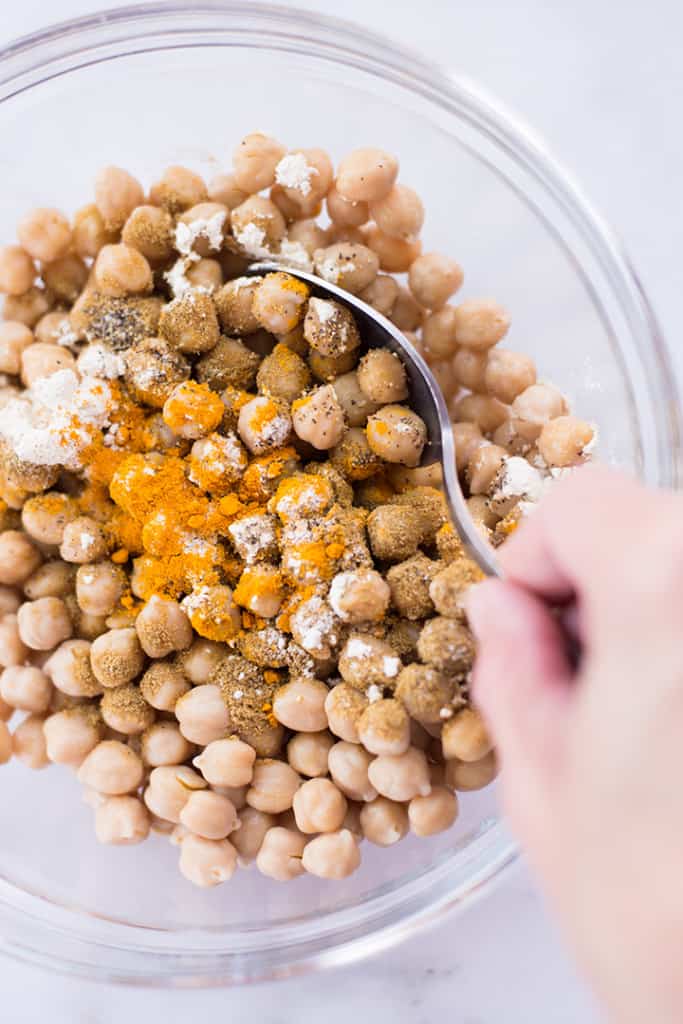
Health Benefits of Chickpeas
If you are looking for food full of health benefits, chickpeas are to your rescue. They are particularly great at promoting heart health, and they are super high in fiber which plays a significant role in reducing cholesterol levels. The soluble fiber in chickpeas binds to cholesterol in the digestive tract, preventing its absorption and helping to lower LDL cholesterol levels, thus reducing the risk of heart disease.
This tiny morsel of deliciousness is also a rich source of potassium, a crucial mineral that supports healthy blood pressure levels. Adequate potassium intake helps counteract the effects of sodium, contributing to better blood pressure control and reducing strain on the heart.
Chickpeas are also packed with antioxidants, such as flavonoids and polyphenols. These powerful compounds help protect against oxidative stress and inflammation, which can contribute to cardiovascular diseases. By neutralizing harmful free radicals, antioxidants promote a healthier cardiovascular system and reduce the risk of heart-related issues.
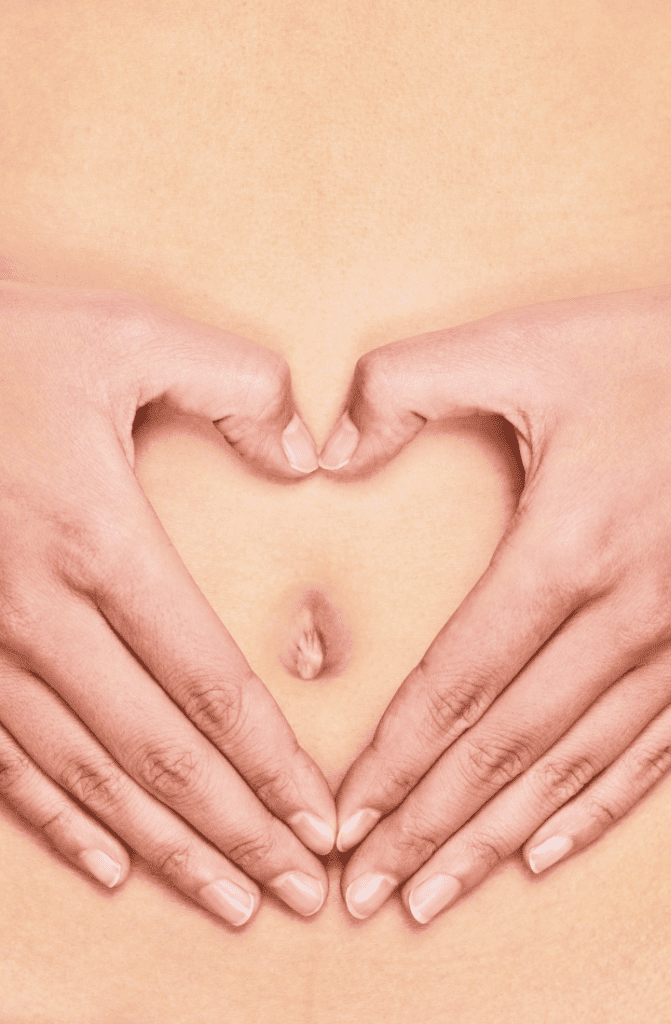
Supports Digestive Health
Chickpeas are a digestive powerhouse, providing excellent support for digestive health in multiple ways. One of their most notable contributions is their high fiber content. The soluble and insoluble fiber found in chickpeas helps promote regular bowel movements, preventing constipation and ensuring a healthy digestive system. By adding bulk to the stool, fiber also aids in waste elimination, supporting overall gastrointestinal function.
This delicious food also possesses prebiotic properties, which means they serve as a food source for beneficial gut bacteria. These prebiotics nourish the gut microbiome, promoting the growth of beneficial bacteria that play a crucial role in maintaining gut health. A balanced and thriving gut microbiome can enhance nutrient absorption, boost immune function, and influence mood and mental well-being.
If you have GI issues, try incorporating chickpeas into your diet as they can potentially reduce the risk of gastrointestinal disorders. The combination of fiber and prebiotics in chickpeas helps create a favorable environment in the gut, reducing inflammation and supporting a healthy gut lining. This can be beneficial in preventing certain gastrointestinal issues like irritable bowel syndrome (IBS) and diverticular disease.
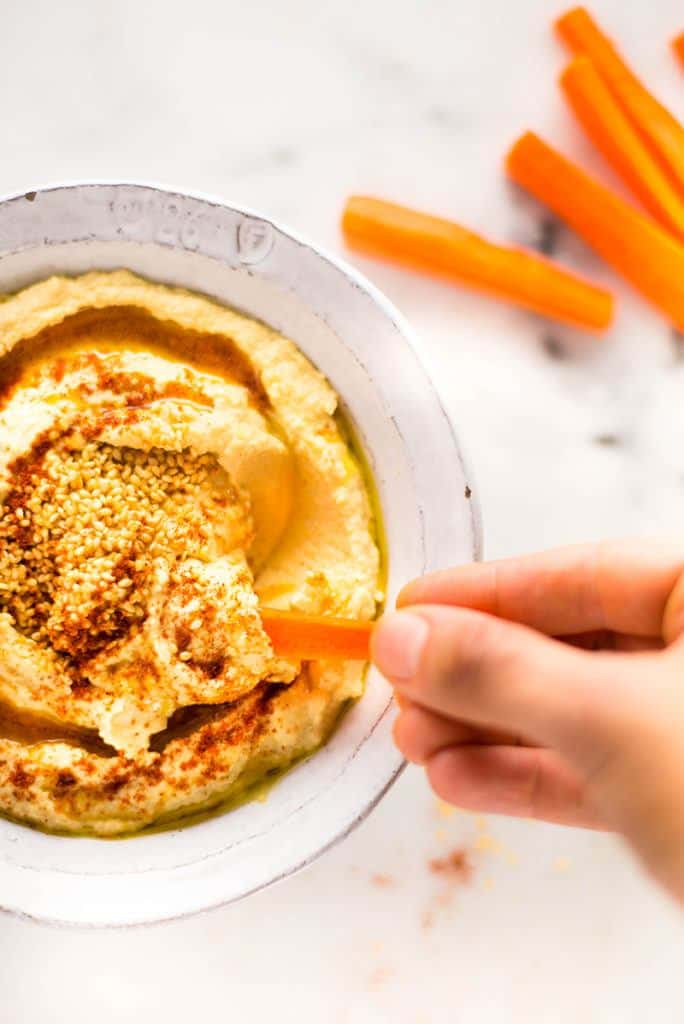
Aids in Controlling Blood Sugar Levels
Chickpeas are a valuable ally and can help control blood sugar levels, particularly due to their low glycemic index (GI). The low GI of chickpeas means that they cause a gradual and moderate increase in blood glucose levels, providing a steady and sustained release of energy. This can benefit individuals with diabetes or insulin resistance, as it helps prevent spikes and crashes in blood sugar levels.
Eating low-GI foods like chickpeas can contribute to better blood sugar management and reduce the need for large amounts of insulin to process glucose. As a result, chickpeas are considered an ideal food for individuals with diabetes or insulin resistance, offering a balanced carbohydrate option that supports stable blood glucose levels. If you are a diabetic and want to make baked goods that will better suit your dietary needs, chickpea flour is a great flour alternative worth trying.

Aids in Weight Management
Eating chickpeas can be a valuable asset in weight management due to their high protein and fiber content. Protein is known for its satiating effect, as it helps reduce appetite and keeps us feeling fuller for longer. Chickpeas provide a plant-based protein source, making them an excellent option for individuals seeking to increase their protein intake without relying on animal products.
The fiber in chickpeas plays a crucial role in weight management because fiber promotes digestive health and adds bulk to the diet. This increases feelings of fullness and reduces overall calorie intake. By slowing down the digestion of carbohydrates, fiber helps stabilize blood sugar levels, preventing sudden hunger pangs and cravings for unhealthy snacks.
When included as part of a balanced diet, chickpeas can be beneficial for weight loss efforts. Their protein and fiber content not only aids in controlling appetite but also provide essential nutrients and energy for overall well-being. Replacing energy-dense and nutrient-poor foods with chickpeas can help individuals create a more satisfying and nourishing diet, contributing to sustainable weight loss and improved overall health.
When you include chickpeas in various meals, such as salads, soups, curries, or as tiny roasted snacks, they offer a delicious and versatile way to support weight management goals while enjoying their many health benefits.

Boosts Bone Health
It may come as a surprise but chickpeas can actually help boost bone health due to their rich mineral content. They are abundant in essential minerals like calcium, magnesium, and phosphorus, which are all vital in maintaining strong and healthy bones.
Calcium is widely recognized as a critical mineral for bone health, as it is the primary building block of bones. Getting adequate calcium through the diet helps support bone structure and strength, reducing the risk of fractures and osteoporosis.
Magnesium is another crucial mineral that works in conjunction with calcium to maintain bone density and structure. It aids in the absorption and utilization of calcium in the bones, ensuring calcium is effectively deposited where needed.
Phosphorus is essential for the formation and maintenance of bone tissue. Alongside calcium, it contributes to the mineral matrix that gives bones their strength and rigidity.
By providing a combination of these bone-boosting minerals, chickpeas contribute significantly to maintaining strong bones and preventing conditions like osteoporosis, which can lead to brittle and weak bones. If you think your bones can use a boost, try these tasty chickpea tacos next taco Tuesday!

Supports Healthy Skin and Hair
Chickpeas offer remarkable support for healthy skin and hair, thanks to their rich content of biotin and zinc. Biotin, also known as vitamin B7, is a water-soluble vitamin that plays a crucial role in promoting healthy hair and nails. It aids in synthesising proteins, which are the building blocks of hair and nails, contributing to their strength and growth. Including chickpeas in your diet can provide a natural biotin source, helping combat hair thinning and brittle nails.
Zinc is another essential mineral in chickpeas that benefits the skin and hair. It is a key component in collagen production, a protein that supports the structure and elasticity of the skin. Adequate collagen levels help maintain youthful and supple skin, reducing the appearance of fine lines and wrinkles. Zinc also supports hair growth and can help prevent hair loss by promoting healthy hair follicles.

Incorporating Chickpeas into Your Diet
Incorporating chickpeas into your diet is a delightful and nutritious way to enjoy their numerous health benefits and does not have to be complicated at all.
Here are some cooking and preparation tips:
- Canned or Dried Chickpeas: You can use canned chickpeas for convenience or dried chickpeas that require soaking overnight before cooking. Both options work well in various recipes.
- Flavorful Seasonings: Chickpeas have a mild flavor, making them perfect for absorbing various seasonings. Try adding spices like cumin, paprika, garlic powder, and a drizzle of olive oil before roasting or sautéing them.
- Hummus Base: Chickpeas are the primary ingredient in traditional hummus. To make a creamy hummus, blend cooked chickpeas with tahini, lemon juice, garlic, and olive oil until smooth. Adjust the seasoning to taste.
- Tortillas! Yep, chickpeas can even be turned into chickpea tortillas using chickpea flour.
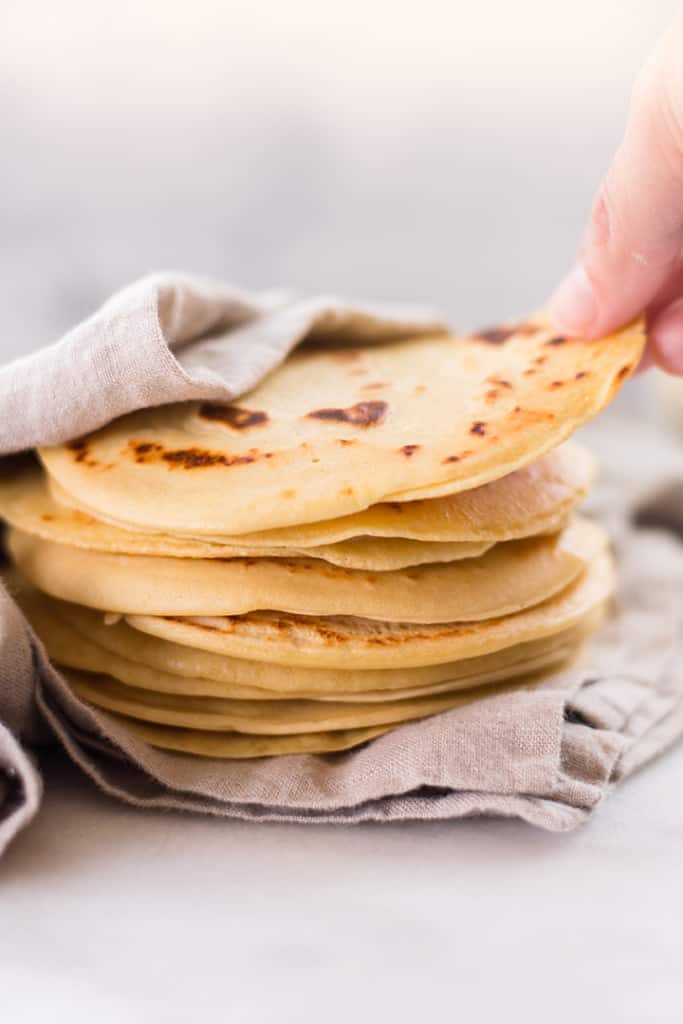
Best Ways to Add Chickpeas to Your Diet
Chickpeas are super versatile and can be used in a variety of dishes. From salads and soups to desserts and snacks, chickpeas are a delicious and easy food to eat regularly.
The best ways to eat chickpeas are:
- Use chickpeas as a base for sweet treats like chocolate chip peanut butter edible cookie dough bites
- Use as a substitute for meat in taco bowls and other preparations
- To make a delicious hummus recipe
- Add to dishes like lemon chicken orzo soup for extra protein
- For extra texture and taste in a mason jar salad
- As a flour substitute to make things like chickpea flour tortillas
- As a high protein base for make-ahead meals
Takeaways
Chickpeas are an absolute must-have in your diet with such an impressive array of health benefits. They can be a game-changer if you aim to improve heart health, support digestion, manage blood sugar, or enhance your skin and hair. Their versatility in cooking allows you to experiment with a wide range of delicious recipes, from salads and Buddha bowls to hummus and savory snacks.
Make it a point to incorporate chickpeas into your daily meals for a nourishing and satisfying addition to your diet. Whether you're a seasoned chef or a novice cook, these legumes are easy to prepare and can elevate any dish. So, stock up on chickpeas and let their remarkable health benefits empower you on your journey to better well-being. By choosing chickpeas as a regular part of your balanced diet, you'll experience improved health and delight in the delightful flavors they bring to your plate. Get started on your journey to a healthier and nutritionally satisfied you!

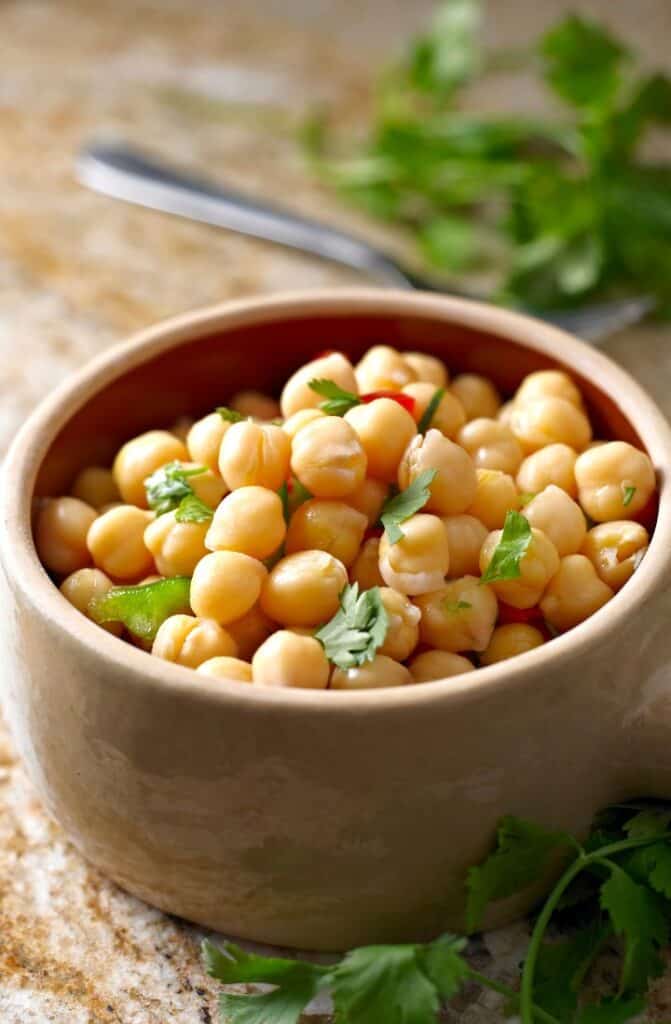
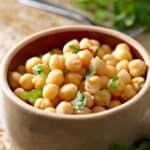
Comments
No Comments